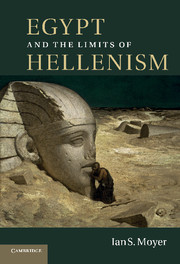Book contents
- Frontmatter
- Contents
- List of figures and table
- Acknowledgments
- Introduction: the absence of Egypt
- 1 Herodotus and an Egyptian mirage
- 2 Luculentissima fragmenta
- 3 The Delian Sarapis aretalogy and the politics of syncretism
- 4 Thessalos and the magic of empire
- Epilogue
- Appendix I Text and translation of the Delian Sarapis aretalogy (IG XI. 1299)
- Appendix II Translation of the Madrid manuscript of Thessalos, De virtutibus herbarum (Codex Matritensis Bibl. Nat. 4631)
- Appendix III Dating the composition of Thessalos, De virtutibus herbarum
- Bibliography
- Index
4 - Thessalos and the magic of empire
Published online by Cambridge University Press: 05 July 2011
- Frontmatter
- Contents
- List of figures and table
- Acknowledgments
- Introduction: the absence of Egypt
- 1 Herodotus and an Egyptian mirage
- 2 Luculentissima fragmenta
- 3 The Delian Sarapis aretalogy and the politics of syncretism
- 4 Thessalos and the magic of empire
- Epilogue
- Appendix I Text and translation of the Delian Sarapis aretalogy (IG XI. 1299)
- Appendix II Translation of the Madrid manuscript of Thessalos, De virtutibus herbarum (Codex Matritensis Bibl. Nat. 4631)
- Appendix III Dating the composition of Thessalos, De virtutibus herbarum
- Bibliography
- Index
Summary
Mysterious and austere, dressed in white linen, head shaved, wise in the ways of magic and divination, the Egyptian priest, known since Herodotus as a fount of ancient wisdom, reappeared in a new literary guise when Egypt, the last of the Hellenistic kingdoms, was made into a province of the Roman empire. Greek and Latin texts – some purely fictional, some professing to tell of actual events – revealed the Egyptian priest as a learned magician, capable of foretelling the future, making the dead speak, consorting with gods, and producing all kinds of powerful effects with spells and magical substances. He could also, at times, impart his esoteric knowledge to others. Egypt became not only a place of deep history and of the distant origins of gods, rites, and doctrines, it was also an archive and school of the occult for those who sought magical knowledge in the present. That, at any rate, was the claim made by the author of a treatise De virtutibus herbarum, a work on astrological botany and one of the more unusual documents to acquire importance in the history of Hellenism. Though one of several technical works on the magical properties of plants and stones preserved from antiquity – works rarely studied outside of specialist disciplines – this particular one has long had a prominent place in the study of religious life in the Hellenistic and Roman periods.
- Type
- Chapter
- Information
- Egypt and the Limits of Hellenism , pp. 208 - 273Publisher: Cambridge University PressPrint publication year: 2011



